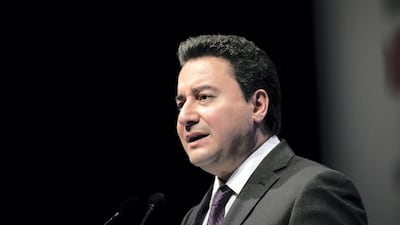Ali Babacan, a founding member of Turkey's ruling Justice and Development Party (AKP) and the holder of several Cabinet posts until 2015, said on Tuesday that he plans to form a new political party by the end of the year.
The announcement comes after his resignation from the AKP in July.
While details about the new party have not been disclosed, Mr Babacan said it would focus on a return to the values he said the AKP had abandoned, such as respect for the rule of law, pluralist democracy and fundamental rights.
The 52 year old is seen as a technocrat who avoided the political intrigues that broke out as Mr Erdogan tightened his grip on the AKP and Turkey in the mid-2010s.
Described by Ahmet Evin, a veteran political scientist who first met Mr Babacan in the early 2000s, as a “mellow Islamist”, Mr Babacan held the posts of deputy prime minister, foreign minister, chief negotiator with the EU and minister for economic affairs after the AKP took power 17 years ago.
“He is unlike almost any Turkish politician I have ever met,” said Prof Evin. “In terms of keeping his word, he’s an unusually upstanding person.”
“He’s an Islamist and a conservative but I don’t think he’s an ideological Islamist. He really believes that without a regulatory environment and rule of law you can’t manage the economy.”
In 2002, Mr Babacan entered the new AKP government as its youngest minister, earning a reputation, at home and in international finance circles, as the man who successfully steered Turkey out of economic crisis and presided over sustained growth while implementing political and economic reforms.
It is this economic acumen that many see as his main selling point.
With a turbulent economy still uppermost in voters’ minds — Turkey entered its first recession in a decade last year and both inflation and unemployment remain in double figures — Mr Babacan’s vision of a return to more orthodox free market policies could prove attractive.
“I do think that Babacan presents the biggest political challenge that Erdogan has faced from within the Islamist tradition,” said Timothy Ash, a senior economist at BlueBay Asset Management in London.
In comments made after Mr Babacan stepped down from the AKP, Mr Ash said the Ankara-born father-of-three was “perhaps the most respected” former minister. Mr Babacan “represents the AKP's liberal wing, which favours maintaining Turkey's Western orientation,” Mr Ash said.
Although Mr Babacan only quit the AKP in July, he left government in 2015, a period when critics say Mr Erdogan grew increasingly authoritarian and intolerant of dissenting voices.
In the months before he left, several pro-government media outlets suggested Mr Babacan had ties with the Gulen movement, which was once allied to Mr Erdogan but is now widely held responsible for attempts to oust him, culminating in a coup attempt three years ago.
As a founding member of the AKP, Mr Babacan helped establish a party that was a broad church of centre-right conservatives, Islamists and economic liberals.
His business background marked him out for the role of overseeing economic affairs.
Mr Babacan, who as a boy would help out at his father’s store in the working class Ulus neighbourhood of Ankara, graduated from the capital’s prestigious Middle East Technical University in 1989.
He received his MBA from Northwestern University in Illinois before spending two years at a financial consultancy in Chicago. On his return to Turkey in 1994 he acted as chief adviser to Ankara’s mayor while also heading his family’s textile business.
Mr Babacan, a keen skier, married his wife Zeynep in 1995. The couple have two sons and a daughter.
His political career saw him move from heading Turkey’s IMF-backed economic reforms in the early 2000s to being appointed chief negotiator with the EU in 2005 as the country sought entry and began implementing wide-ranging changes to align with European regulations.
He served as an MP for Ankara from 2002 to 2018, deciding not to stand in last year’s election.

